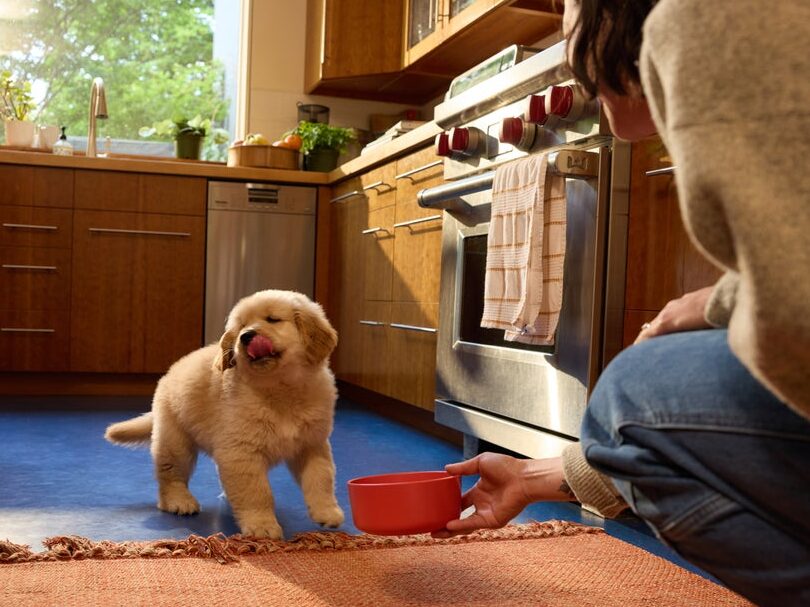Hey Ollie blog readers! We’re offering you an exclusive 60% OFF your starter box! Try now!
Some dog owners allow their pets on their couches or to sleep in their beds. But what if you don’t want your dog to do that? If you are a new pet parent and have decided the furniture is a dog-free zone in your home, you may be wondering how to keep your new pet off the furniture.
Five tips to keep your furniture dog free
- Give your dog their own bed or couch and show them how to use it.
If you and your family are sitting on the couch or on the bed and you don’t want the dog to join you, one thing you can do is teach the command go to your bed or go to your place. Having a comfy spot near the humans will help your pet feel close to you without having to be on the furniture.
- Do not ever let your dog on forbidden furniture under any circumstances.
Dogs don’t generalize well so if your pet is allowed on the bed with the kids, but mom says no, that can be confusing for your pet and hard to reinforce. If the dog isn’t allowed on the couch, the bed or any other piece of furniture the dog can’t ever be on the couch, the bed, or any other piece of furniture. All houseguests must also obey these rules if you want them to stick!
Another thing that can be confusing for your pet is a home with multiple couches. If you let your dog on the family room couch but not the formal living room that can be confusing. If you want to do this, the best bet is to keep the pet out of the formal living room so he is not tempted to test out that couch.
- Do not let your pet have access to the furniture when you are not home.
This means crate training your pet or gaiting off the area where the forbidden furniture is so your pet access it when you aren’t home to redirect them to a more appropriate place.
- Do not let your dog counter surf or hop up on the dinner table.
While it might be adorable to see your dog “stand” at the counter and look like he’s cooking, what you don’t want is a dog who thinks they can help themselves to a plate of meat or worse something toxic like a bowl of grapes or dish filled with onions.
- Reward your dog for staying off the furniture.
If your best friend cooperates and keeps themselves off the furniture – be sure to reward generously for good behavior. This can be in the form of a favorite toy or bone on his bed, treats for listening or just some playtime with you!
Should I consider letting my dog on the furniture?
This is a totally personal decision that you need to make for yourself. While some owners can’t imagine not allowing their dogs to share the bed other people want their pups to sleep in their own beds. If you have an antique couch in the living room no one goes in, you may also want to keep the dog from making that his nap spot, BUT if the whole family is cramming on the living room couch to watch Disney+ it might be okay for you to let your pup join in there. Just know that once you’ve allowed the dog on a piece of furniture, it’s much harder to say no in the future!
Why do dogs even go on the furniture in the first place?
Same reason you do, it’s comfortable and their favorite people are there. Your dog may want to be on the couch, the bed or cozied up on a favorite ottoman to spend time with you.
If you don’t want your dog on your furniture there are other ways to accomplish this. You can have snuggle time on the floor or on their bed for example.
How To Keep Dogs Off The Furniture
If your pup has claimed the couch as their throne, you’re not alone. Many dogs love curling up on furniture because it’s soft, smells like their favorite humans, and gives them a good view of what’s going on. But if you’d prefer to keep your furniture fur-free, here are some effective ways to set boundaries:
1. Give Them an Irresistible Alternative
Dogs love comfort, so make sure they have a cozy bed of their own. Place it near where they like to lounge and reward them with treats and praise when they use it. If they associate their bed with positive experiences, they’ll be more likely to choose it over the couch.
2. Use Training and Consistency
Teach a command like “Off” or “Go to your bed” and be consistent. If your dog jumps on the furniture, calmly guide them off and direct them to their bed. Reinforce good behavior with treats and praise. The key is patience—consistency will help them understand the rule.
3. Block Access When You’re Not Home
If your dog sneaks onto the furniture when you’re not looking, try using baby gates, closing doors, or placing upside-down chairs or cushions on the couch to make it less inviting. A little inconvenience goes a long way in breaking the habit.
4. Use Deterrents
Dogs don’t like certain textures or scents. Try placing aluminum foil, double-sided tape, or a pet-safe deterrent spray on the furniture to make it less appealing. Most dogs will decide the couch isn’t worth the trouble.
5. Be Mindful of Mixed Signals
If your dog is allowed on the couch sometimes but not others, they’ll get confused. Make the rule clear—either they’re allowed, or they’re not. If you want a middle ground, try using a designated pet blanket that signals when they can be on the furniture.
6. Provide Plenty of Exercise and Mental Stimulation
A bored dog is more likely to push boundaries. Make sure they’re getting enough physical activity and mental stimulation throughout the day. A well-exercised pup is less likely to seek out the couch for entertainment.
What to do if your dog still won’t stay off the furniture
Be consistent
Ensure you are not sending mixed messages to your pet about what you expect. If your pet gets on a piece of furniture they shouldn’t be on, tell them off and take them to their bed or place. You can give them a bone or toy on their bed or place to play with.
Try a physical barrier
This could include closing the door to a room you don’t want your dog to play in or using baby gates to block off areas they should not be in.
If one of those options won’t work, there are several products designed to keep your pet off the furniture. These include:
X-Mat Pet Training Mat: This can be placed on your furniture directly. It contains small, pointy nubs that deter your pet from spending time on your furniture. It comes in a few sizes depending on the size you need.
Couch defenders: These products create a physical barrier so that your pets can’t get on the furniture in the first place. They come in neutral colors like brown and beige and they can easily be folded and stored when you have company and want to use your couch or other furniture. These products work best in rooms that have furniture that isn’t used frequently including guest rooms and living rooms that are primarily used for entertaining.
Furniture pads: these make a crinkling sound that deters your pet from jumping on the couch.
You’ll want to avoid products that cause your pet pain or scare them when they go near the furniture. These products could make your pet scared of the that piece of furniture (or you) and they do not teach your pet what you do want them to do! These include:
A can of pennies that you’d shake at your dog when he gets on a piece of furniture he isn’t supposed to be on. This can cause an adverse reaction or scare your pet.
PetSafe Scat Mat: This mat uses static electricity like shocks to keep your pet off the sofa. While not painful it can be uncomfortable for your best friend. This mat does not help your pet learn what to do. It only provides a ‘correction’ for doing the wrong thing.
Sofa Scram Sonic Dog & Cat Repellent Mat:When your pet steps on this mat it emits a 95-decibel beep that is irritating. This can cause your pet to avoid the piece of furniture and area around it – but not for the right reasons.
Obedience training
If your pet is becoming territorial over your couch, bed or other furniture or is finding ways to sneak onto a piece of furniture after you’ve repeatedly told them no, don’t panic. While you might make the choice to share your couch or bed with your best friend you don’t want your dog to think he owns it. If your pet growls or snaps when someone tries to sit on ‘his’ spot or your pet won’t move over to make room for your partner you may have an issue. Contact a knowledgeable dog trainer or behaviorist who can help you work through the challenge.
They may give you some training exercises to do with your dog to help reinforce the behavior you want (staying off or away from the furniture). Look for trainers who use positive reinforcement and humane training methods to help your pet feel physically and psychologically safe.
Tagged As:

The nutrition your dog needs,
the food they want.

Enjoying our articles? Subscribe our Newsletters and get new articles directly to your inbox
You might also like
13 May 2025
8 MINS READ
Puppy Training Guide & Behavior Timeline
Bringing home a puppy is pure magic. It’s also pure chaos—tiny teeth, zoomies, accidents in the house, and moments that make you wonder if you’re raising a future genius or a tiny tornado. …
by Ollie Pets
10 May 2025
12 MINS READ
New Puppy Checklist: Guide To Prepare For A New Dog
Bringing home a new puppy? This checklist covers everything new dog owners need—from essential supplies to training, feeding, and first vet visits.
by Ollie Pets
3 April 2025
9 MINS READ
Home Remedies for Fleas on Dogs: 10 Natural Ways That Actually Work
Wondering what kills fleas on dogs instantly and naturally? If your pup is scratching like crazy, it may be time to take action. In this guide, we’ll show you the most effective home remedies for…







